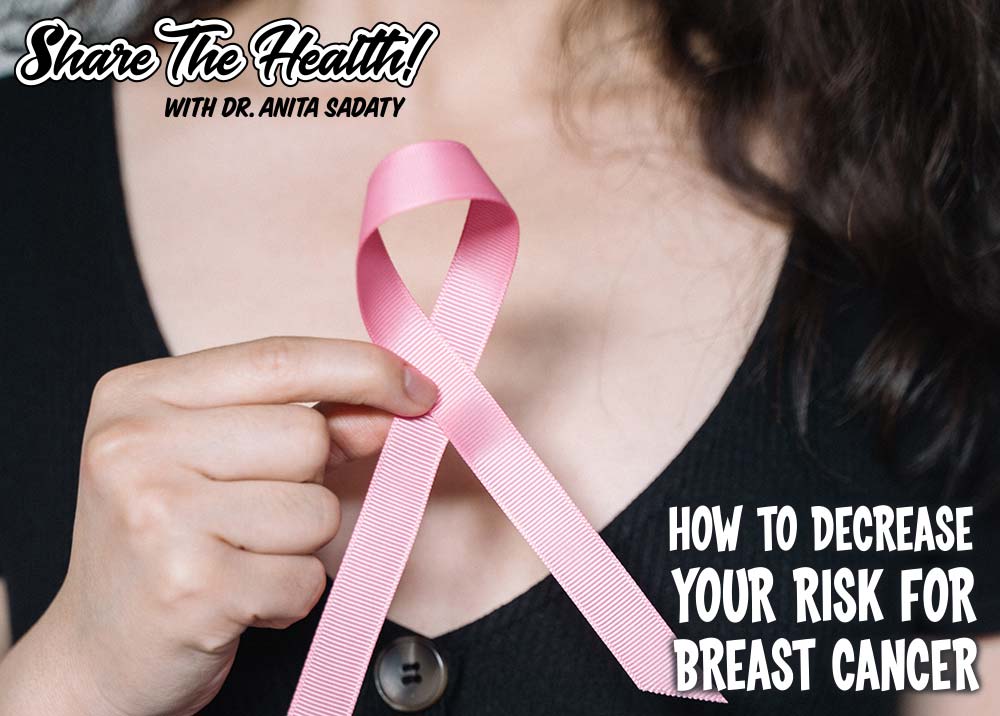
By Dr. Lucy Gade
How To Reduce Your Risk Of Breast Cancer
As October is upon us, so are all the PINK ribbons and clever marketing campaigns to remind us that Breast Cancer is still a thing. For many women whose lives have already been affected by a diagnosis of Breast Cancer, these reminders are unnecessary.
The reality is that one in eight American women will develop breast cancer in the course of their lifetime. For those who have yet to be touched, it should not be a waiting game. Regular “screening” is touted as the most effective way to reduce breast cancer deaths. Even so, experts continue to debate WHO should be screened, HOW OFTEN and WHAT AGES.
Not enough is said about what women can do on their own to lower their risk of getting breast cancer in the first place. Some risk factors, such as family history, can’t be changed. But, there are lifestyle changes you can make to lower your risk. The Functional Medicine approach emphasizes individuals’ control in optimizing wellness to potentially avoid breast cancer and other fearful diagnoses.
So, here’s a list of DON’Ts (let’s just get these out of the way) and DOs to get us started on the right track to better health and PREVENTION.
[Please Note: Following this guide may prevent diseases other than breast cancer, like- heart disease (the number one killer in women) and diabetes.]
THE DON’Ts — “One of the most important actions is inaction.”
✘ Don’t DRINK ALCOHOL.
Women who consume two to five drinks a day are 40 percent more likely to get breast cancer than nondrinkers. In fact, just one drink a day can raise a woman’s cancer risk by about 7 percent. Alcohol affects the level of sex hormones that increase cancer risk. Among women already treated for breast cancer, consuming three or four drinks a week increases the risk of a recurrence. This is especially true for postmenopausal women and women who are overweight.
✘ Don’t SMOKE.
Though the number of smokers has fallen dramatically in the last half century, the proportion of women who smoke is consistently on the rise. A study of 102,098 women in Norway and Sweden found that, compared with nonsmokers, those who smoked 10 or more cigarettes a day for 20 or more years had a third higher risk of developing invasive breast cancer. Girls who started smoking before age 15 were nearly 50 percent more likely to get breast cancer.
✘ Don’t GAIN WEIGHT.
As body mass index (B.M.I.) rises, so does a woman’s risk of developing breast cancer, especially if much of the excess weight is around the waist. This is because abdominal fat is metabolically active, producing growth factors and hormones, including estrogen, that can stimulate the growth of breast cancer cells. So, avoid gaining weight over time, and try to maintain a body-mass index of 25 or less.
The DO’s. Research shows that lifestyle changes can decrease the risk of breast cancer, even in high risk women. Breast cancer prevention starts with healthy habits.
✓ Eat Healthy.
Consume fiber-rich vegetables, fruits and whole grains, minimize protein foods like red meat that are rich in saturated fats, and eliminate sugar-sweetened foods and drinks.
A recent study found the lowest risk of breast cancer among women with the highest intake of fruit and vegetables. The strongest association was found, not for women who changed their diets after breast cancer, but for those who ate lots of fruit and vegetables early in life and continued to do so as adults. So, start NOW!
Especially protective are vegetables and fruits rich in substances called carotenoids, the orange-colored plant pigments that are precursors of vitamin A. These include not just sweet potatoes, carrots and winter squash but also dark-green leafy vegetables like spinach and kale, as well as fruits like cantaloupe and tomatoes.
Although there is no overall link between dairy products and breast cancer risk, high-fat dairy foods like cheese, ice cream and whole milk, which naturally contain estrogen, may shorten the lives of breast cancer survivors.
✓ Exercise.
Research suggests that increased physical activity, even when begun later in life, reduces overall breast-cancer risk by at least 10 percent. All it takes is moderate exercise like a 30-minute walk five days a week to get this protective effect.
✓ Get your blood sugar and insulin in check.
Sugar feeds cancer cells. Cancer is not good at burning fat but instead burns up sugar. If you are pre-diabetic or diabetic, or if you eat a lot of sugar and processed carbs you are potentially feeding cancer cells. This is why periodic fasting and keto-diets can be part of an anti-cancer treatment strategy. Aim for a fasting blood glucose of less than 90 and a fasting insulin of less than 5.
✓ Optimize your vitamin D levels.
Women who have vitamin D levels above 50 have lower rates of breast cancer. Vitamin D is critical to a healthy immune system. Your immune system is what keeps everything in check and keeps cancer at bay. Aim for Vitamin D levels between 50 and 80.
✓ Reduce inflammation.
Your body’s response to injury and infection is to produce inflammation. In the short term, this is necessary and important. But, chronic inflammation depletes your immune system and allows stray cancer cells to develop without any defense.
Checking some inflammatory markers like hsCRP (high sensitivity C- reactive protein, ferritin, ESR (erythrocyte sedimentation rate), a CBC or white blood cell count (high end or low end of the range is a red flag), and ANA (anti nucleic acid antibodies) can give information about your “inflammatory status.” However, if these are all normal you are not necessarily in the clear. These markers don’t represent EVERY single mediator in your body that indicates inflammation and they don’t necessarily tell us where the inflammation is. But, abnormal markers can be used to track your progress with treatment as they decrease and normalize.
✓ Reduce stress.
Your adrenal glands that sit atop each of your kidneys are the ones responsible for cranking out the stress hormones cortisol and adrenaline. High or low cortisol levels can lead to a pro-cancer environment.
To help maintain proper cortisol levels, you need to be in bed by 10:00PM and need to sleep Eight or more hours. Women who sleep less than seven hours a night have a higher risk of breast cancer and breast cancer recurrence compared to women who sleep eight hours or more a night. Besides sleep, stress management includes: eliminating the over scheduling, reducing the rushing, and improving your relationships.
Try meditation, yoga, gratitude journaling, dancing, gardening, walking in nature, petting a dog, acupuncture, massage, breath work or volunteering; all shown to calm the adrenal response. And, cancer prevention is another reason to get rid of the toxic people in your life!
✓ Make sure your thyroid is working well.
There is a link between having an under-active thyroid (hypothyroidism) and having a greater risk of breast cancer. TSH levels should ideally be between 0.5 and 1.5.

What Supplements Can I Take For Prevention?
Supplements are no replacement for a healthy lifestyle, but may help support health in addition to good nutrition, sleep, exercise and stress reduction. Below is a list of supplements that are generally considered beneficial for most people. You should always speak with your doctor and do your own research before taking any supplements.
- Vitamin D — 2,000 IU a day of a good Vitamin D/K2 combo is recommended. If using a 5,000 IU D3 tablet, 1 tablet 3 day/week if you have normal levels, or take one tablet daily for a few months if you are deficient then recheck your serum levels. Check out K Force by Ortho Molecular.
- Probiotics — Increased use of antibiotics has been associated with multiple cancers including breast. If you have any signs of imbalances with your digestion, acne, rosacea or frequent yeast infections then adding a probiotic to your regimen is a good idea. Check out Orthobiotic (Ortho Molecular) and Megasporebiotic (Microbiome labs). If you tend towards yeast, consider a probiotic that has Saccharomyces boulardii like FloraMyces (Designs for Health). Always start with one capsule a day and over time you can increase to 2 a day.
- Sulforaphane — This is the essential ingredient in cruciferous vegetables like broccoli and kale that has been shown to decrease the progression of cancer cells and helps your body resist the impact of toxins. This supplement may help give your body a little more protection against toxic exposures. Designs for Health has a great product called BroccoProtect.
- Fish oil — It’s ability to reduce system wide inflammation is likely why fish oil may have a beneficial impact on reducing breast cancer risk. Orthomega (Ortho Molecular) is a terrific option.
- Green Tea Extract — This is an amazing antioxidant due to its high amount of polyphenols. A 2018 review suggested that the active ingredient in green tea, EGCG may help reduce recurrence rates and delay the onset of cancer. Drink three cups of green tea a day or try a supplement: Green Tea Phyto caps (Gaia Herbs), 2 capsules 1-2x/day
- Turmeric — Studies show that turmeric may kill cancer cells and slow tumor growth, however most of this research is in animal models. It can interfere with cancer chemotherapy, so avoid during treatments. Check this one out: Turmero (Apex Energetics) — dosing depends on your inflammatory status. Starting dose is 1 tsp a day and if you have ongoing inflammation you can increase to 2 times a day.
What else can I do?
Check out our Prevent with Five program with Functional Health Coach MaryAnn Jones to find out how your daily actions can reduce your risk by 30% despite risk factors, genetics, environment and age. 516.801.1313.
Begin optimizing your wellness! Call our office to schedule a Functional Medicine appointment that takes into account lifestyle, risk factors, and comprehensive lab analysis to outline a personalized plan for achieving better health.
If you notice any changes in your breasts, such as a new lump or skin changes, consult your doctor immediately. Also, ask your doctor when to begin mammograms and other screenings based on your personal history.
Please Share the Health if you liked what you read!!!
For more information about my wellness programs and my practice, check out my website drsadaty.com. Hey Look! You are already here…
Ready for the legal disclaimer? Information offered here is for educational purposes only and does not constitute medical advice. As with any health recommendations, please contact your doctor to be sure any changes you wish to consider are safe for you!